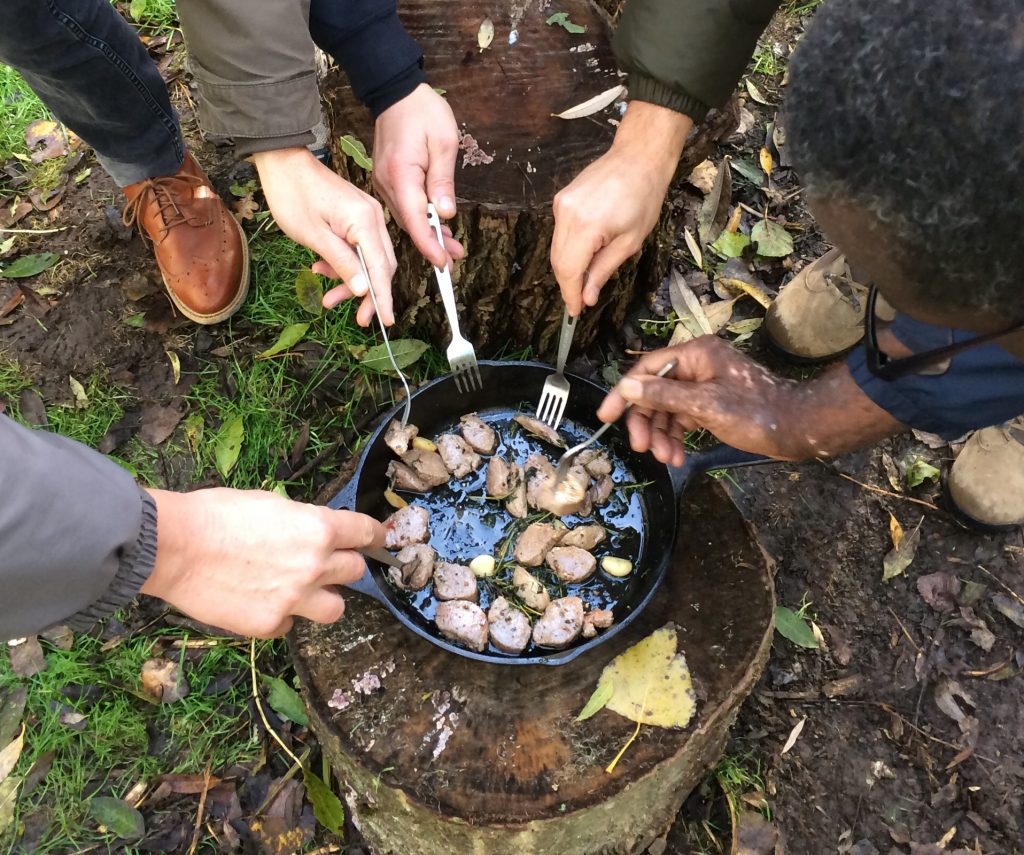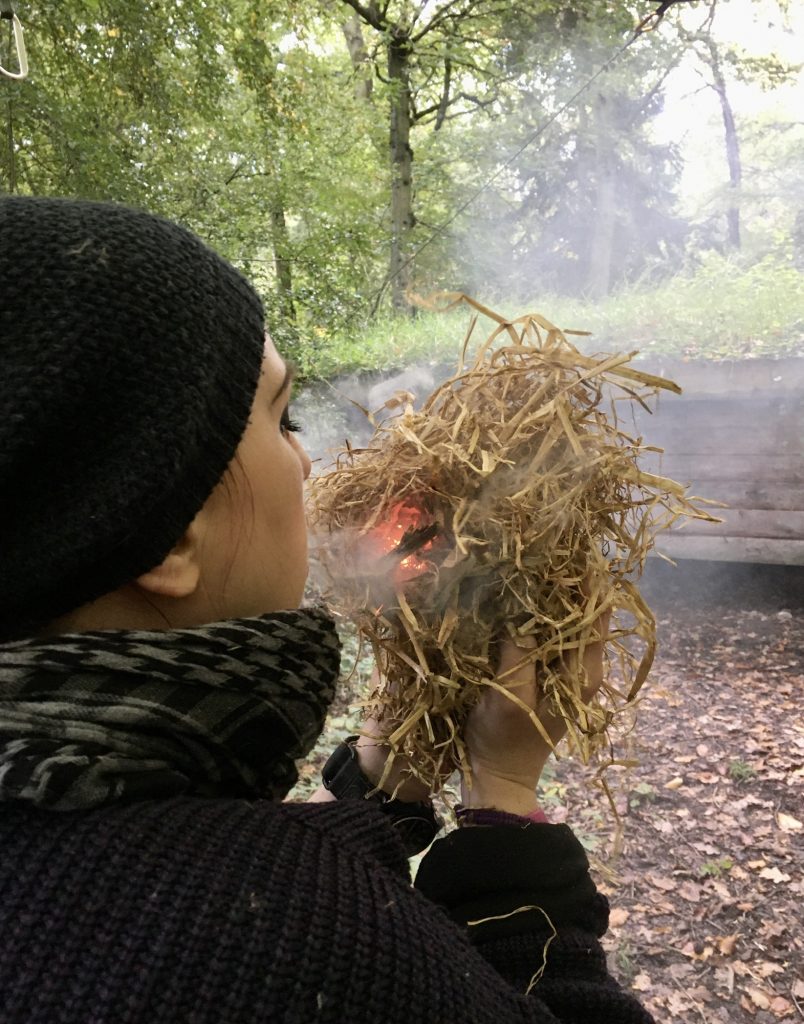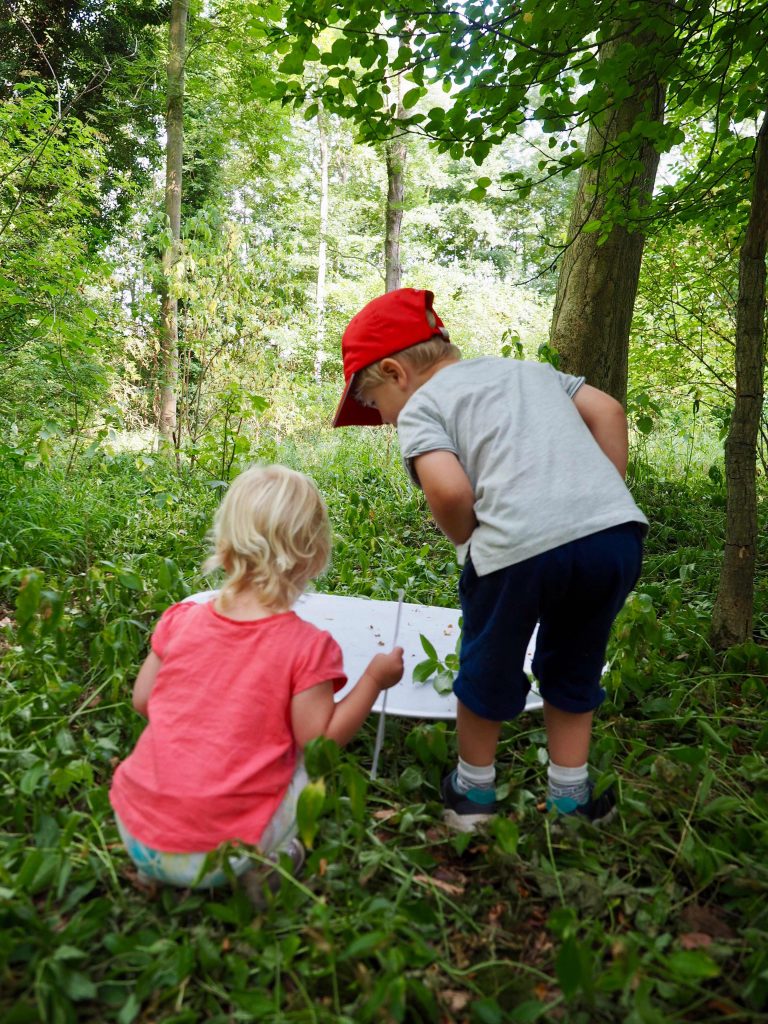Bushcraft
3rd August 2021
If you think about bushcraft, you might envisage Ray Mears or Bear Grylls eating bugs in the jungle and wrestling desert snakes. But survival in the wild can be a lot closer to home. While you may not need the skills to endure wading in Arctic waters, Louise Goss finds out that there’s a lot that we can learn from living wild in the local woods

We have, of course, our own intrepid explorer from this local area. Ed Stafford, who was born in Peterborough and went to school in Uppingham, holds the Guinness World Record for being the first person to trek along the Amazon River. It’s an expedition that saw him eat piranhas and monkeys and took him nearly two and a half years. While Ed’s tale is an extreme one of true survival from living off the land, it’s something youngsters and adults can begin to learn at a basic level, even in our own communities.
What is bushcraft – and why do it?
Bushcraft is the practice and learning of skills to help you survive in the natural environment. It is about using what is around you, taking you back to nature and your hierarchy of needs. No smart phones or hot showers… it’s thinking about where you get food, water and shelter.
While we may believe these particular skills are redundant in modern-day life, learning some basic bushcraft can be a really enriching experience that equips you for our hi-tech lives as well. ‘If you’re out in the wilderness, bushcraft enables you to get out of a situation if need be,’ explains Dominic Brister, founder of men’s mental health charity, Don’t Lose Hope. Based in Bourne, he has also been a bushcraft educator for the last 20 years. He has worked with hundreds of children through his time in schools and even collaborated with people who have been part of Bear Grylls’ team.
‘What happens when the phone doesn’t have a signal?’ he asks. ‘When you can’t get a GPS signal, how can you navigate by the stars? You might never need to do it, but you might get into a situation when you do. An emergency is a situation you never expect to happen.’
Some of the key foundational skills that people learn in bushcraft are how to light fires and build shelters. Yet skills can develop into making your own knives and tools, tracking and identifying animals, and foraging for food.
Fun is a big part of it, as is connecting with nature and learning more about the wildlife on our doorstep. ‘Creating a deeper connection to the local woodlands is really important for us,’ says Alison O’Connor, director and lead instructor at Tinder Sticks, a social enterprise and the learning providers at Fineshade Wood, managed by Forestry England. ‘We feel really passionate about connecting our events to the wider forest. Events we run are in season and in keeping with the surroundings. We work with the plants and animals that we have around us… Our aim is to get people more outdoor confident.’ Bushcraft offers so many different opportunities for this, whether it’s making tea or soup from nettles or whittling some wood.

Dominic has a similar goal. He holds workshops for children to help them grow ‘a bit of bushcraft confidence’ in their large community garden in Bourne. ‘In our garden we have probably about 30 different edible plants that you wouldn’t realise are so,’ he says.
He teaches the children how to make use of what’s around them. He helps them to build their knowledge using sharp-edged tools and teaching them how to light fires. The workshops often include CPR training backed up by the British Heart Foundation. ‘It’s a chance for children to get outside and get off technology for a few hours,’ Dominic says.
Jancis Dunn from The Bushcraft Company, which runs events out of Boughton Woods, says that as well as getting to know nature, it helps you to get to know yourself. The Bushcraft Company’s residential courses for organised groups can include basic bushcraft skills to learning SOS survival with wilderness first aid. This includes how to find help and how to move a person through the woods if they are injured. Attendees can even practise rescuing people from a plane-crash scenario.
Bushcraft benefits
Apart from the practical skills that people learn through bushcraft, there are the emotional tools and the mental resilience that it helps to develop. Participants also discover leadership qualities and improve their teamwork.
Jancis says it helps to foster a can-do and try-again attitude. ‘When something doesn’t work, you’ve got to keep going, otherwise you’re not going to be able to live out there or do your activities,’ she says. ‘It’s character building… It’s about doing something a bit different, trying something new, trying it again, and then celebrating afterwards.’
She sees many students with The Bushcraft Company push themselves out of their comfort zones and then feel more confident doing that in their everyday lives. With younger children, she also sees their approach to learning change, as they become more resourceful.

Alison explains that there are several ways we can benefit from learning about bushcraft. ‘Not only does it connect us back to our ancestors, using your hands and focusing on the here and now takes you away from what’s going on in your mind and the stresses of everyday life… If you immerse yourself into the woodland, and concentrate on making nettle string or whittling with a knife, not only do you create something functional but there’s the benefit of improving your mental well being.’
Dominic sees first hand the mental-health benefits that being outdoors in nature can bring. ‘Just being outside is good for mental health. It’s a digital detox,’ he says. He has run workshops for families to help them reconnect. ‘I show the kids what to do, and then the parents have to learn from the kids. It’s a massive shift.’ He has also used bushcraft to help educate people convicted of knife crime about how to make and use a knife properly. It changes their perspective on seeing a knife as a tool rather than a weapon, and and he says they saw repeat offences decline.
The joy and sense of accomplishment from learning a new skill is another huge benefit. Alison says there is real delight in seeing somebody’s face after mastering how to light a fire or building their shelter and getting to crawl inside it. There is an ecological impact as well. By getting closer to nature and reconnecting with the land, Alison says, ‘We are creating future forest guardians. This is what we need. People don’t spend enough time outdoors, enjoying the forest.’
Risk-taking
Of course, when it comes to fire and knives, there is an element of risk and danger. But Alison believes we have grown to be too scared of taking any risks. Dominic agrees. ‘You learn about fire safety, you learn what not to do, and the fact that, without fire, we wouldn’t be where we are today as humans… We need fire. We learn about the fire triangle, we learn the science of it. If they are older teenagers, we’ll build friction fires where we rub sticks together… Sadly, too many parents see fire and say, “Stay away from it, you can’t do it.” Without fire, we can’t cook or heat or eat.’
LOCAL BUSHCRAFT PROVIDERS
TINDER STICKS
Fineshade Wood, near Corby, Northants
Tinder Sticks hold various bushcraft events and workshops for all ages throughout the year at Fineshade Wood.
Forest School sessions: For pre-schoolers in term time
Bushcraft Adventure afternoon: Upcoming events in August and September
Family Bushcraft Camps: Includes an overnight stay in the woods; upcoming events in August and September
Adult Bushcraft Courses: One-day courses held on Saturdays
• Introduction to Bushcraft: basic skills session includes fire, shelter and water purification. Upcoming event in September
• Bushcraft Skills: Includes basics as well as field craft, tracking and camp craft. Upcoming event in October
Women-only workshops For women to reconnect and have some time and space for themselves.
Monthly walk in the woods: Free nature connection walk for adults; includes exploring seasonal changes, plants, tracking and footprints, trees and plants.
Venison workshop Learn where our food comes from; includes butchery and outdoor cooking. Upcoming event in November
For all details, dates, times and prices, see upcoming events at: tindersticks.org.uk
DON’T LOSE HOPE
Bourne, Lincs
Children’s bushcraft workshops (from age 9 up).
Find details of all upcoming events on their website, dontlosehope.co.uk, under Community Garden. For any other events or further information, contact: dom@dontlosehope.co.uk
THE BUSHCRAFT COMPANY
Boughton Woods, Geddington, Northants
Bushcraft for organised groups such as schools, Scouts, and youth groups, who can book events between May and October. All courses are residential and last from 2–5 days with overnight stays. Adult camps are offered at other venues further afield, including Oxfordshire and Potters Bar.
More information at thebushcraftcompany.com
NENE OUTDOORS
Ferry Meadows, Nene Park, Peterborough
Nene Outdoors hold a variety of bushcraft sessions throughout August, focusing on different aspects of the craft, from tools to firelighting to shelter building. Each session is for children aged 7 years and up and costs £5.50.
See website for all dates and booking details: www.nenepark.org.uk
ADVENTURE RUTLAND
Adventure Rutland is a mobile events company catering for organised groups across the region. They can hold bushcraft events as part of team-building challenges.
More information at www.adventurerutland.com



